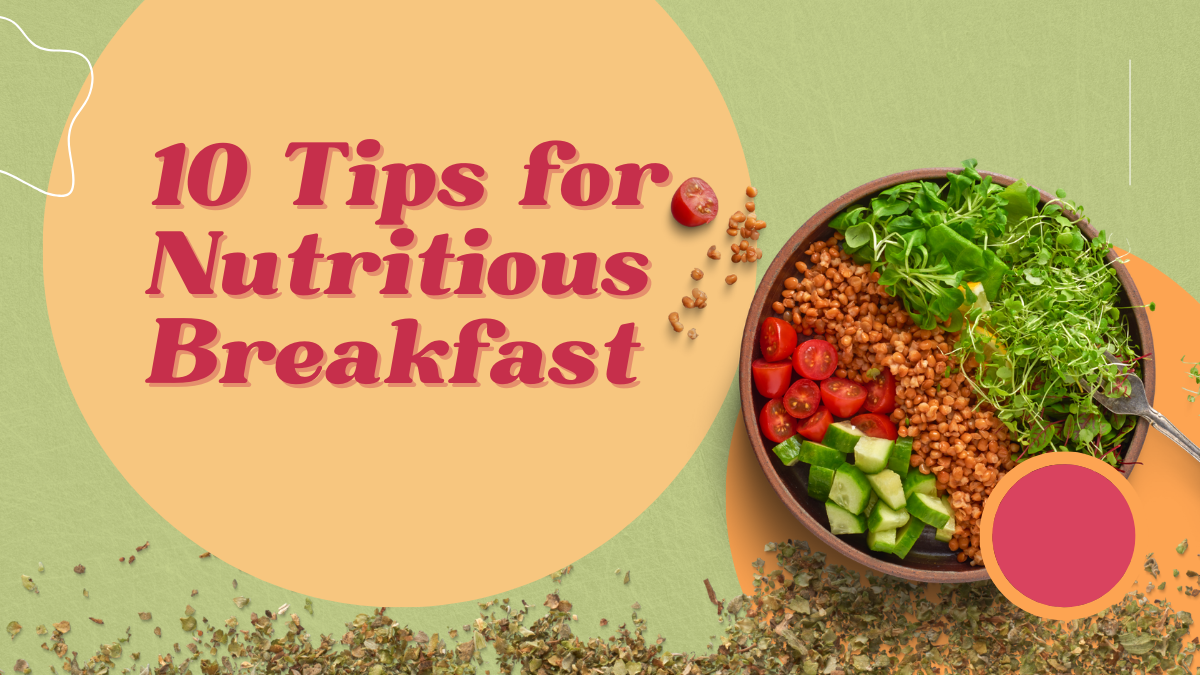
Introduction
Nutritious Breakfast, often touted as the most important meal of the day, plays a crucial role in setting the tone for our overall health and well-being. As the first meal we consume after an extended period of fasting overnight, it’s essential to fuel our bodies with nutritious foods that provide the energy and nutrients needed to kickstart our day. In this article, we’ll explore the significance of a nutritious breakfast, its benefits, components, and practical tips for incorporating it into our daily routines.
Table of Contents
1. Benefits of Eating a Nutritious Breakfast
Improved Cognitive Function
A nutritious breakfast is like fuel for our brain, enhancing cognitive function, memory, and concentration throughout the day. Studies have shown that individuals who eat a balanced breakfast experience better performance in tasks requiring attention and problem-solving skills compared to those who skip it.
Weight Management
Contrary to popular belief, eating a wholesome breakfast can aid in weight management by jumpstarting metabolism and reducing the likelihood of overeating later in the day. Additionally, it helps regulate hunger hormones, preventing cravings for unhealthy snacks.
Increased Energy Levels
Starting the day with a nutritious breakfast provides a steady source of energy, preventing mid-morning crashes and fatigue. By replenishing glycogen stores and stabilizing blood sugar levels, it ensures sustained energy for optimal productivity and physical performance.
2. Components of a Nutritious Breakfast
A balanced breakfast should include a combination of carbohydrates, proteins, healthy fats, vitamins, and minerals to provide sustained energy and promote satiety. Here are essential components to consider:
Whole Grains
Incorporate whole grains such as oats, quinoa, whole wheat bread, or brown rice to provide complex carbohydrates for lasting energy and fiber for digestive health.
Proteins
Include lean protein sources like eggs, Greek yogurt, cottage cheese, or tofu to support muscle repair and growth, regulate appetite, and enhance satiety.
Healthy Fats
Incorporate sources of healthy fats like nuts, seeds, avocados, or olive oil to promote brain health, reduce inflammation, and enhance nutrient absorption.
Fruits and Vegetables
Add a variety of colorful fruits and vegetables to your breakfast for vitamins, minerals, antioxidants, and fiber. Opt for fresh or frozen options and aim to include at least one serving with each meal.
3. Ideas for Nutritious Breakfast Meals
Oatmeal with Fresh Fruit and Nuts
Start your day with a bowl of oatmeal topped with sliced bananas, berries, and a sprinkle of nuts or seeds for added crunch and nutrients.
Greek Yogurt Parfait
Layer Greek yogurt with granola, sliced fruits, and a drizzle of honey or maple syrup for a satisfying and protein-rich breakfast option.
Avocado Toast
Spread mashed avocado on whole grain toast and top with sliced tomatoes, a poached egg, and a dash of sea salt and black pepper for a delicious and nutrient-packed meal.
Smoothie Bowls
Blend together your favorite fruits, leafy greens, protein powder, and a liquid base like almond milk or coconut water, then top with nuts, seeds, and granola for a refreshing and customizable breakfast option.
4. Tips for Making Breakfast More Nutritious
Plan Ahead
Take some time to plan your breakfast meals for the week, and prep ingredients in advance to streamline the morning routine. Consider batch cooking grains, chopping fruits and vegetables, or pre-portioning smoothie ingredients for quick and easy assembly.
Include Variety
Experiment with different combinations of ingredients to keep breakfast interesting and ensure you’re getting a diverse array of nutrients. Rotate between sweet and savory options, and don’t be afraid to try new recipes or cultural breakfast dishes.
Limit Added Sugars
Be mindful of hidden sugars in breakfast cereals, pastries, and flavored yogurt, which can contribute to energy crashes and cravings later in the day. Opt for unsweetened or lightly sweetened options, and use natural sweeteners like fruit or honey sparingly.
Don’t Skip Protein
Make sure to include a source of protein in your breakfast to support muscle health, regulate appetite, and prevent blood sugar spikes. Aim for at least 15-20 grams of protein per meal, whether from animal or plant-based sources.
5. Common Myths About Breakfast Nutrition
Skipping Breakfast Helps with Weight Loss
Contrary to popular belief, skipping breakfast can actually sabotage weight loss efforts by slowing metabolism, increasing cravings for high-calorie foods, and disrupting hunger hormones.
All Breakfast Foods Are Healthy
Not all breakfast foods are created equal. While some options like whole grains, fruits, and lean proteins offer valuable nutrients, others like sugary cereals, pastries, and processed meats can be high in calories, sugar, and unhealthy fats.
Breakfast Should Be the Largest Meal
The idea that breakfast should be the largest meal of the day is not necessarily true for everyone. Focus on eating until you feel comfortably satisfied, rather than adhering to arbitrary portion sizes. Listen to your body’s hunger and fullness cues to determine appropriate meal sizes throughout the day.
6. The Importance of Balancing Macronutrients
Carbohydrates
Carbohydrates are the body’s primary source of energy, making them an essential component of a nutritious breakfast. Opt for complex carbohydrates like whole grains, fruits, and vegetables, which provide sustained energy and fiber for digestive health.
Proteins
Proteins are the building blocks of life, playing a crucial role in muscle repair, immune function, and hormone production. Including a source of lean protein in your breakfast helps promote satiety, regulate blood sugar levels, and support overall health.
Fats
Healthy fats are vital for brain health, hormone balance, and nutrient absorption. Incorporate sources of monounsaturated and polyunsaturated fats like nuts, seeds, avocados, and olive oil into your breakfast to enhance flavor and nutritional value.
7. The Role of Breakfast in Overall Health
A nutritious breakfast sets the tone for our overall health and well-being, influencing various aspects of physical, mental, and emotional wellness.
Heart Health
Eating a balanced breakfast rich in whole grains, fruits, vegetables, and healthy fats supports heart health by lowering cholesterol levels, reducing inflammation, and promoting healthy blood pressure.
Metabolism
Starting the day with a nutritious breakfast jumpstarts metabolism, helping the body burn calories more efficiently and maintain a healthy weight.
Digestive Health
Fiber-rich foods like whole grains, fruits, and vegetables promote digestive health by regulating bowel movements, preventing constipation, and nourishing beneficial gut bacteria.
8. Challenges and Solutions for Eating a Nutritious Breakfast
Time Constraints
Many people cite lack of time as a barrier to eating a nutritious breakfast. To overcome this challenge, consider prepping ingredients in advance, opting for quick and portable options, or setting aside a few minutes each morning for meal preparation.
Lack of Appetite in the Morning
Some individuals may struggle to eat breakfast due to a lack of appetite in the morning. Start with small, easily digestible options like smoothies, yogurt, or fruit, and gradually build up to larger meals as your appetite increases.
Preparation Tips
Make breakfast preparation a priority by setting aside dedicated time each week for meal planning, grocery shopping, and cooking. Batch cook staples like grains, proteins, and vegetables to streamline the morning routine and ensure you always have nutritious options on hand.
9. Incorporating Breakfast into Different Lifestyles
Busy Professionals
For busy professionals, quick and convenient breakfast options are key. Stock your kitchen with grab-and-go items like Greek yogurt, pre-cut fruits and vegetables, hard-boiled eggs, and whole grain toast with nut butter for a nutritious start to the day.
Students
Students can benefit from hearty breakfast options that provide sustained energy and focus throughout the morning. Experiment with overnight oats, breakfast burritos, or make-ahead muffins packed with protein, fiber, and essential nutrients.
Athletes
Athletes require fuel to support their intense training regimens and active lifestyles. Prioritize nutrient-dense foods like eggs, lean meats, whole grains, and fruits to optimize performance, aid in muscle recovery, and prevent fatigue.
10. Impact of Skipping Breakfast
Decreased Concentration
Skipping breakfast can impair cognitive function, memory, and concentration, making it difficult to focus and perform daily tasks effectively.
Increased Risk of Overeating Later in the Day
Skipping breakfast often leads to increased hunger and cravings later in the day, potentially resulting in overeating, poor food choices, and weight gain.
Hormonal Imbalances
Skipping breakfast can disrupt hormone levels, leading to fluctuations in insulin, cortisol, and ghrelin, which regulate appetite, energy levels, and metabolism.
Healthy Breakfast Options for Specific Dietary Needs
Vegetarian and Vegan
Vegetarians and vegans can enjoy a wide range of nutritious breakfast options, including plant-based proteins like tofu, tempeh, legumes, and nuts, paired with whole grains, fruits, and vegetables.
Gluten-Free
Individuals with gluten intolerance or celiac disease can still enjoy a delicious and nutritious breakfast by choosing gluten-free grains like quinoa, buckwheat, amaranth, and certified gluten-free oats, along with fruits, vegetables, and protein-rich foods.
Low-Carb
For those following a low-carb diet, breakfast options abound, from eggs and vegetables to Greek yogurt with berries and nuts, or smoothies made with avocado, spinach, and protein powder.
The Relationship Between Breakfast and Mental Health
Mood Regulation
Eating a balanced breakfast stabilizes blood sugar levels and neurotransmitters in the brain, promoting stable moods and reducing the risk of mood disorders like depression and anxiety.
Reduced Stress
Starting the day with a nutritious breakfast can help reduce stress levels by providing the body with essential nutrients and energy needed to cope with daily challenges and responsibilities.
Enhanced Productivity
A nutritious breakfast fuels the brain and body, enhancing cognitive function, productivity, and creativity throughout the day.
Environmental and Ethical Considerations
Sustainable Food Choices
Choose sustainably sourced and locally grown ingredients whenever possible to reduce your carbon footprint and support environmentally friendly farming practices.
Fair Trade and Organic Products
Opt for fair trade and organic products to support ethical labor practices, minimize exposure to pesticides and synthetic chemicals, and promote biodiversity and soil health.
Visit Website :- guest post buy
Also visit :- Telegram
Conclusion
In conclusion, a nutritious breakfast is the foundation of a healthy start to the day, providing essential nutrients, energy, and cognitive function. By incorporating a variety of whole grains, proteins, healthy fats, fruits, and vegetables into your breakfast routine, you can support overall health, improve mood and productivity, and set the stage for lifelong wellness.
FAQs (Frequently Asked Questions)
1. Is it okay to skip breakfast if I’m not hungry in the morning?
Ans. It’s essential to listen to your body’s hunger cues and eat breakfast when you feel hungry. However, if you consistently find yourself not hungry in the morning, consider starting with a small, nutrient-dense option and gradually increasing your intake over time.
2. Can I have coffee or tea instead of breakfast?
Ans. While coffee or tea can provide a temporary energy boost, they should not be used as a substitute for a balanced breakfast. Pair your morning beverage with a nutritious meal to provide sustained energy and nutrients throughout the day.
3. Are pre-packaged breakfast options healthy?
Ans. Pre-packaged breakfast options can vary widely in nutritional quality. Read labels carefully and opt for options with minimal added sugars, unhealthy fats, and artificial ingredients. Whenever possible, choose whole, minimally processed foods for optimal health benefits.
4. How can I make breakfast more exciting and enjoyable?
Ans. Get creative with your breakfast options by trying new recipes, experimenting with different ingredients, and incorporating a variety of flavors, textures, and colors into your meals. Get inspired by cuisines from around the world and make breakfast a delicious and enjoyable part of your day.
5. What if I don’t have time to prepare breakfast in the morning?
Ans. Plan ahead by prepping ingredients, cooking in batches, and utilizing time-saving kitchen tools and appliances. Consider quick and portable options like overnight oats, smoothie packs, or pre-made breakfast sandwiches that can be enjoyed on the go.





